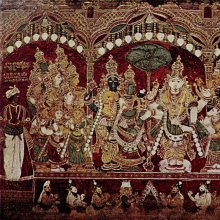Tirumala, Thirumala: 6 definitions
Introduction:
Tirumala means something in Hinduism, Sanskrit, the history of ancient India. If you want to know the exact meaning, history, etymology or English translation of this term then check out the descriptions on this page. Add your comment or reference to a book if you want to contribute to this summary article.
Images (photo gallery)
In Hinduism
Vaishnavism (Vaishava dharma)
Source: Prabhupada Books: Sri Caitanya CaritamrtaTirumala (तिरुमल).—According to Śrī Caitanya Caritāmṛta, Madya-lila 9.64, “Śrī Caitanya Mahāprabhu next arrived at Tirupati and Tirumala, where He saw a four-handed Deity. Then He next proceeded toward Veṅkaṭa Hill”.

Vaishnava (वैष्णव, vaiṣṇava) or vaishnavism (vaiṣṇavism) represents a tradition of Hinduism worshipping Vishnu as the supreme Lord. Similar to the Shaktism and Shaivism traditions, Vaishnavism also developed as an individual movement, famous for its exposition of the dashavatara (‘ten avatars of Vishnu’).
Nyaya (school of philosophy)
Source: WikiPedia: NyāyaTirumala or Advaitavidyacarya Tirumala was the father of Annambhatta, the author of the Tarka-Sangraha.—He was Tailanga Brahmin of North Arcot District of erstwhile state of Andhra Pradesh who had settled down in Benares.[5] Tirumala was a Rigvedi Smarta Brahmana well versed in Vedanta philosophy. Annambhatta was a learned man in several areas of traditional scholarship, namely, Nyaya, Vyakarana, Vedanta and Purva-Mimamsa.

Nyaya (न्याय, nyaya) refers to a school of Hindu philosophy (astika), drawing its subject-matter from the Upanishads. The Nyaya philosophy is known for its theories on logic, methodology and epistemology, however, it is closely related with Vaisheshika in terms of metaphysics.
India history and geography
Source: Shodhganga: Siddha Cult in TamilnaduTirumala refers to one of the various famous Siddha Centre distributed throughout South India and Tamil Nadu. The Siddha cult represents a Tantric philosophy that emerged from the combination of several elements found in traditions such as Shaivism (viz., Pashupata), Shaktism, Jainism, Tantric Buddhism (Vajrayana), etc. Both the Siddha and the Navanath cult (i.e., Nava-natha, ‘nine saints’) are popular in South India [viz., Tirumala] and Tamilnadu. A Siddha was an inspired seer belonging to the marginalized sections of society who dissolved their past karma and crushed the roots of future karma.

The history of India traces the identification of countries, villages, towns and other regions of India, as well as mythology, zoology, royal dynasties, rulers, tribes, local festivities and traditions and regional languages. Ancient India enjoyed religious freedom and encourages the path of Dharma, a concept common to Buddhism, Hinduism, and Jainism.
Languages of India and abroad
Sanskrit dictionary
Source: Cologne Digital Sanskrit Dictionaries: Aufrecht Catalogus Catalogorum1) Tirumala (तिरुमल) as mentioned in Aufrecht’s Catalogus Catalogorum:—This Southern name has been turned into Trimalla.
2) Tirumala (तिरुमल):—Gītagaurī. Rice. 270. Gopālāryā. Rice. 270. Bhrāntivilāsa campū. Rice. 252.
3) Tirumala (तिरुमल):—Siddhāntakaumudyanuvyākhyā [grammatical]
4) Tirumala (तिरुमल):—Gītagovindaṭīkā.
[Sanskrit to German]
Sanskrit, also spelled संस्कृतम् (saṃskṛtam), is an ancient language of India commonly seen as the grandmother of the Indo-European language family (even English!). Closely allied with Prakrit and Pali, Sanskrit is more exhaustive in both grammar and terms and has the most extensive collection of literature in the world, greatly surpassing its sister-languages Greek and Latin.
See also (Relevant definitions)
Starts with: Tiru-malaikatti, Tiru-malainayakkar, Tiru-malaivatai, Tiru-malarcelvi, Tiru-malavataram, Tiru-malayutam, Tirumala acarya, Tirumala bhatta, Tirumala Nayaka, Tirumala somayajin, Tirumala yajvan, Tirumalai, Tirumalaikoil, Tirumalarkkuricil.
Ends with: Tiruppati-Tirumala.
Full-text (+12): Tirumala somayajin, Ashvalayanaprayogadipika, Tirumala bhatta, Tirumala yajvan, Gitagauri, Sumanorama, Venkatadri bhatta, Tirumala acarya, Annambhatta, Uttaracarita, Dharmasetu, Tirupati, Cuddapah, Suvarnamukhi, Ati-maturakavi, Tirumala Nayaka, Trimalla, Tiruppati-Tirumala, Kadapa, Venkata.
Relevant text
Search found 11 books and stories containing Tirumala, Thirumala; (plurals include: Tirumalas, Thirumalas). You can also click to the full overview containing English textual excerpts. Below are direct links for the most relevant articles:
The history of Andhra country (1000 AD - 1500 AD) (by Yashoda Devi)
Part 8 - Tirumalayadeva Maharaja (1590-1550) < [Chapter XVIII - The Saluvas]
Part 56 - The Later Gajapatis < [Chapter XIII - The Dynasties in South Kalinga]
Part 9 - The Saluvas of Tirupati < [Chapter XVIII - The Saluvas]
Triveni is Seventy Years Young < [July – September, 1997]
The Tamils and the Andhras < [July-September, 1928]
Trichinopoly - the Athens of South India < [November-December, 1929]
Nyaya-Vaisheshika categories (Study) (by Diptimani Goswami)
Life of Annaṃbhaṭṭa < [Chapter 1 - Introduction]
Temples in and around Madurantakam (by B. Mekala)
Hoysalas and the Muslim Invasion < [Chapter 1 - Historical Backdrop]
Later Chola Temples (by S. R. Balasubrahmanyam)
Appendix: Timeline of Vikrama Chola’s contributions < [Chapter IV - Temples of Vikrama Chola’s Time]
Bhagavatpadabhyudaya by Lakshmana Suri (study) (by Lathika M. P.)
Sanskrit Mahākāvyās on Śaṅkara’s Story of Life < [Chapter 1 - Life and Works of Lakṣmaṇa Sūrin]
Śaṅkaradigvijaya (list of available works) < [Chapter 4 - Similarities and Dissimilarities]
Related products


